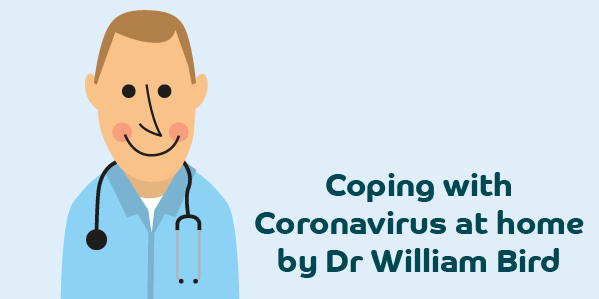Dr William Bird discusses ways of coping with Coronavirus at home

The most severe cases of Coronavirus may be in the headlines at the moment, however, many people will be dealing with the virus at home.
As you probably know, the most common symptoms of Covid-19 are a high temperature, a new cough and shortness of breath. Many people also report fatigue, headaches and even loss of taste and smell.
The BMJ published new guidelines on 20th April 2020, from NICE in collaboration with NHS England and NHS Improvement, on the best ways of fighting the virus at home.
Dr William Bird, CEO of Intelligent Health and founder of the Beat the Street game, works at the Royal Berkshire Hospital and is seeing patients with Covid-19 on a daily basis.
He said: “Symptoms of Coronavirus can vary, and there are even some people that may have the virus without displaying symptoms at all. If you have a milder form of Coronavirus, then these tips may be useful. Of course, if you or a family member is showing signs that concern you, as discussed in this video, then do call 111 or even 999”
1. Breathlessness
Breathlessness seems to be a universal symptom of Coronavirus. Sometimes it’s accompanied by a pressure in the chest, or even a burning sensation in the chest, and of course, struggling to breathe, causes anxiety which in turn can increase breathlessness further. The first thing to do is to slow your breathing down by controlled breathing exercises. Try closing your mouth and breathing through your nose for several seconds. Then exhale slowly through pursed lips for 4-6 seconds. Repeat this until your breathing is back under control. Doctors also recommend that if you are breathless, you do not lie on your back. Instead, sit upright; then relax and drop your shoulders. Try not to hunch your shoulders as this encourages anxiety.
2. Cough
William adds: “Cough can be one of the first symptoms, or one of the last and can go on for as long as two or weeks. Experts advise that the best thing to take to assist with this is honey, believe it or not! For anyone over the age of one, you can take a spoonful of honey two to three times a day. If this isn’t effective, an over-the-counter codeine linctus js recommended – for short term use only. Don’t forget to keep hydrated and ensure your house isn’t too dry.
3. Fever
This is most common five days after exposure to the infection and it’s not advisable to bring the temperature down as a high temperature is needed to kill the virus. Unless you have a headache or are feeling unbearably uncomfortable, let the temperature do its job – it could even reach 38-39 degrees. Try to use paracetamol – avoiding ibuprofen for now - and drink plenty of fluid, preferably up to 2 litres of water daily - regularly to avoid dehydration.
If your condition worsens and you’re getting increasingly breathless, or perhaps, you find you can’t speak or get your words out well, then please do call 111 and someone will be able to help you and assess whether you should see a doctor.
Stay well and please feel free to get in touch via the Beat the Bug social media pages if you have any questions.


